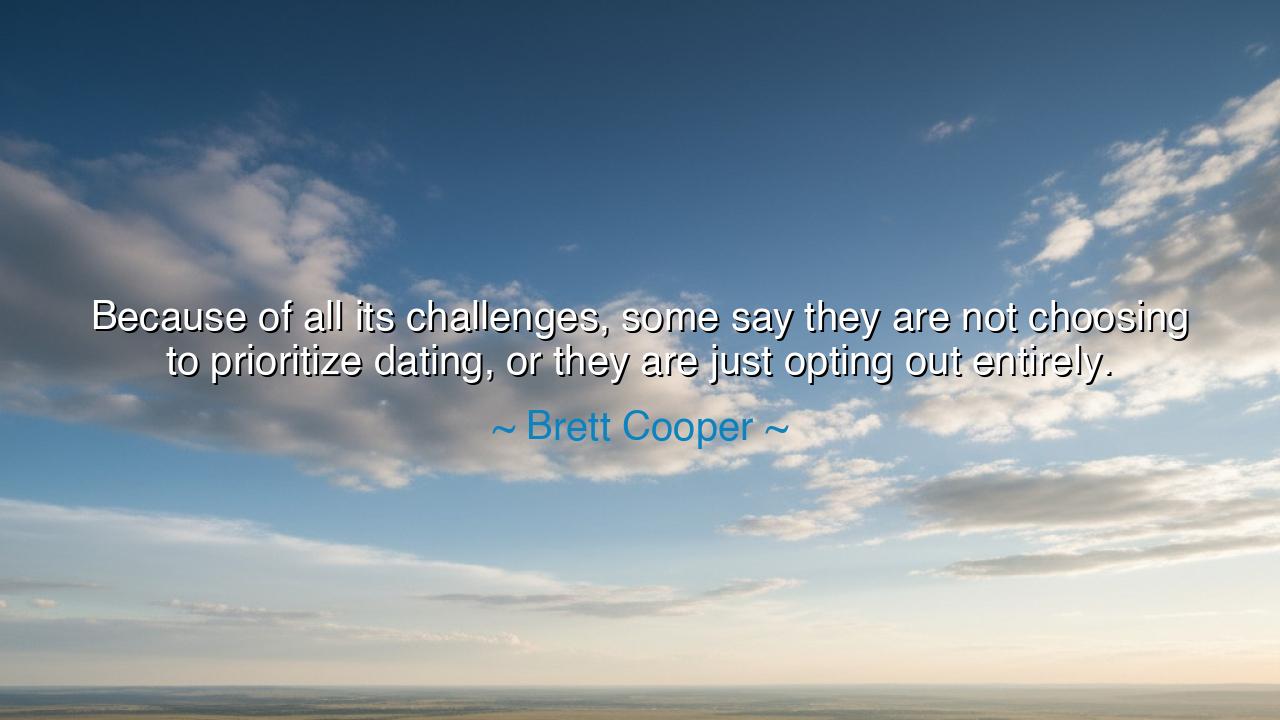
Because of all its challenges, some say they are not choosing to
Because of all its challenges, some say they are not choosing to prioritize dating, or they are just opting out entirely.






The words of Brett Cooper—“Because of all its challenges, some say they are not choosing to prioritize dating, or they are just opting out entirely”—speak to the quiet fatigue of a generation burdened by the complexities of modern life. Beneath their calm phrasing lies a truth both ancient and enduring: when life grows tangled and heavy, the heart often retreats. What Cooper observes is not merely a trend of the present age, but a reflection of an old human rhythm—the rhythm of retreat and renewal, of souls seeking shelter when the world’s noise grows too loud. Her words echo the eternal question: what happens to love when the world becomes too difficult to love in?
In every era, the nature of connection reflects the state of society. When life is peaceful, hearts are open; when life grows harsh, people turn inward. Cooper’s quote reveals this turning. In an age of digital distraction and ceaseless striving, many no longer find dating to be a joy, but a test. The old simplicity of meeting, courting, and loving has been replaced by screens, algorithms, and anxieties. The spirit that once sought companionship in the laughter of another now wanders through the glare of modern life, uncertain where to rest. Thus, many step back—not because they have lost the need for love, but because they have lost faith in how to find it.
This weariness is not new. The ancients, too, faced times when the weight of the world dulled the flame of the heart. In the final days of Rome, when decadence and cynicism clouded the once noble republic, poets like Juvenal lamented that love itself had grown transactional and cold. Many withdrew from intimacy, choosing solitude over the games of power and vanity. Yet even then, as now, the human longing for connection endured beneath the ashes of disillusionment. Cooper’s words capture that same tension: the sorrow of those who retreat, and the faint, unspoken hope that something truer still waits beyond the clamor.
To opt out entirely, as she says, is not merely to refuse dating; it is to protect one’s inner world from disappointment. But therein lies the paradox of the human heart—it seeks safety from pain even as it hungers for belonging. The choice to step away may grant peace for a time, yet it risks loneliness, a quieter wound that deepens slowly. For love, though challenging, is also the forge through which the soul learns patience, humility, and grace. Without it, the spirit risks growing cold and self-contained, losing touch with the sacred vulnerability that makes us human.
The story of Emily Dickinson, the poet of solitude, stands as a mirror to this truth. Withdrawn from the world, she turned inward, her poems alive with yearning and clarity. She did not “prioritize dating,” nor seek companionship in the ordinary sense—but her writings reveal the paradox of isolation: that even in distance, she longed for communion. Her withdrawal was both shield and sacrifice. So too, the modern soul that steps back from love is not without feeling; it is overflowing with it, but uncertain how to give without breaking.
Cooper’s reflection calls us, then, to examine not only the world, but ourselves. The challenges of modern love—distraction, fear, the idolization of independence—are real, but they are not new. The path forward lies not in rejection, but in reclamation. Love must be rebuilt upon honesty, not performance; on patience, not speed; on curiosity, not convenience. To prioritize love is not to surrender ambition or strength, but to remember that the heart, too, requires cultivation. Like any garden, it withers when neglected.
And so the lesson, passed down from the ancients to our own weary generation, is this: do not let hardship turn you from the human need to connect. If you must rest, rest; if you must retreat, retreat—but return when your spirit is ready. For though love demands courage and endurance, it remains the purest teacher of meaning. The heart may be bruised, but it is never beyond repair. When you open it again—slowly, humbly—you become part of the eternal rhythm that has sustained humanity from the beginning: to seek, to trust, to love, despite the weight of the world.
So, remember this, my friends: to love in difficult times is the greatest act of rebellion. For every age finds reasons to withdraw, yet those who keep believing, who keep showing up despite the uncertainty, are the ones who ensure that love endures. And though it may not come swiftly, nor without cost, the one who dares to prioritize it will find, in the end, not just companionship, but the quiet triumph of a soul that chose connection over fear.






AAdministratorAdministrator
Welcome, honored guests. Please leave a comment, we will respond soon